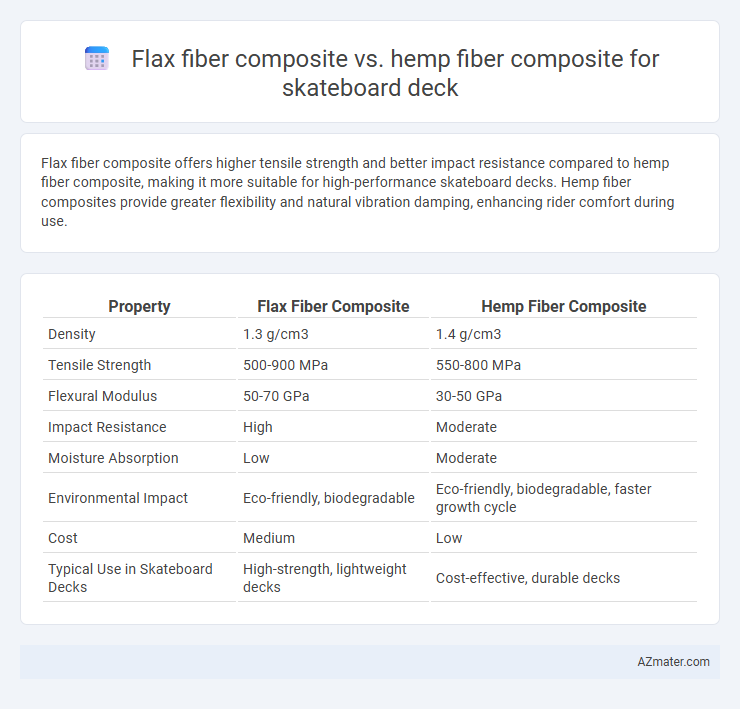Flax fiber composite offers higher tensile strength and better impact resistance compared to hemp fiber composite, making it more suitable for high-performance skateboard decks. Hemp fiber composites provide greater flexibility and natural vibration damping, enhancing rider comfort during use.
Table of Comparison
| Property | Flax Fiber Composite | Hemp Fiber Composite |
|---|---|---|
| Density | 1.3 g/cm3 | 1.4 g/cm3 |
| Tensile Strength | 500-900 MPa | 550-800 MPa |
| Flexural Modulus | 50-70 GPa | 30-50 GPa |
| Impact Resistance | High | Moderate |
| Moisture Absorption | Low | Moderate |
| Environmental Impact | Eco-friendly, biodegradable | Eco-friendly, biodegradable, faster growth cycle |
| Cost | Medium | Low |
| Typical Use in Skateboard Decks | High-strength, lightweight decks | Cost-effective, durable decks |
Introduction to Sustainable Skateboard Deck Materials
Flax fiber composite and hemp fiber composite are emerging as sustainable alternatives to traditional materials in skateboard deck manufacturing, offering renewable and biodegradable properties. Flax fibers provide high tensile strength and low weight, enhancing deck performance while reducing environmental impact. Hemp fibers contribute exceptional durability and moisture resistance, making them an eco-friendly choice that supports sustainable production in the skateboarding industry.
Overview of Flax Fiber Composites
Flax fiber composites offer excellent mechanical properties such as high tensile strength and low density, making them ideal for lightweight skateboard decks that require durability and flexibility. These composites are derived from natural flax fibers combined with bio-based or synthetic resins, delivering enhanced impact resistance and vibration damping compared to traditional materials. Their sustainability and biodegradability also position flax fiber composites as an eco-friendly alternative in skateboard manufacturing.
Overview of Hemp Fiber Composites
Hemp fiber composites offer significant advantages for skateboard decks due to their high tensile strength, lightweight properties, and excellent vibration damping compared to traditional materials. The natural cellulose content in hemp fibers enhances impact resistance and durability, making the decks more resilient under repetitive stress and dynamic loads. Sustainable cultivation and rapid growth cycles of hemp contribute to an eco-friendly manufacturing process, reducing the environmental footprint in composite production.
Mechanical Properties: Flax vs Hemp Fiber Composites
Flax fiber composites exhibit higher tensile strength and stiffness compared to hemp fiber composites, making them more suitable for skateboard decks requiring durability and impact resistance. Hemp fibers offer greater flexibility and better vibration damping, contributing to a smoother riding experience but with slightly lower mechanical strength. The superior modulus of elasticity in flax composites enhances deck rigidity, while hemp composites provide improved toughness and energy absorption under dynamic loads.
Weight and Flexibility Comparison
Flax fiber composites typically offer lower weight and higher flexibility compared to hemp fiber composites, making them ideal for lightweight and responsive skateboard decks. Hemp fiber composites, while slightly heavier, provide superior durability and impact resistance, contributing to a sturdier deck structure. The choice between flax and hemp fibers depends on the desired balance between weight reduction and deck resilience.
Durability and Impact Resistance
Flax fiber composites exhibit high tensile strength and flexibility, enhancing the durability of skateboard decks by resisting fatigue under repeated stress. Hemp fiber composites offer superior impact resistance due to their natural shock absorption properties and toughness, making them effective at dampening sudden forces during falls or jumps. Both materials provide eco-friendly alternatives, but flax composites tend to outperform in long-term wear, while hemp excels in impact energy dispersion.
Environmental Impact: Flax vs Hemp Cultivation and Processing
Flax fiber composites offer a lower environmental impact due to their shorter growing cycle and reduced water requirements compared to hemp, making them a sustainable choice for skateboard decks. Hemp cultivation demands more land and higher water consumption but provides stronger fiber yield, which can enhance deck durability. Processing flax fibers typically requires less energy and fewer chemicals, further reducing the composite's overall carbon footprint relative to hemp fiber composites.
Cost Effectiveness and Market Availability
Flax fiber composites offer a more cost-effective solution for skateboard decks due to lower raw material and processing expenses compared to hemp fiber composites. Hemp fiber composites, while providing high strength and durability, often come at a higher price point and limited availability in mass markets. The widespread cultivation and processing infrastructure for flax fibers contribute to better market accessibility and consistent supply chains for skateboard manufacturers.
Performance in Real-world Skateboarding Conditions
Flax fiber composites offer high tensile strength and excellent vibration damping, making skateboard decks more resilient to impact and providing smoother rides on rough surfaces. Hemp fiber composites exhibit superior durability and flexibility, enhancing deck longevity and resistance to cracking under repetitive stress during tricks. Both materials maintain lightweight profiles, but flax composites tend to outperform hemp in stiffness, while hemp composites excel in shock absorption, influencing rider control and comfort in dynamic skateboarding conditions.
Conclusion: Choosing the Best Fiber Composite for Skateboard Decks
Flax fiber composites offer superior flexibility and impact resistance, making them ideal for dynamic skateboard decks requiring enhanced durability and rider comfort. Hemp fiber composites provide excellent tensile strength and environmental sustainability, appealing to eco-conscious riders seeking sturdy yet lightweight boards. Selecting the best fiber composite depends on prioritizing either performance and flexibility with flax or strength and sustainability with hemp for optimal skateboard deck construction.

Infographic: Flax fiber composite vs Hemp fiber composite for Skateboard deck
 azmater.com
azmater.com